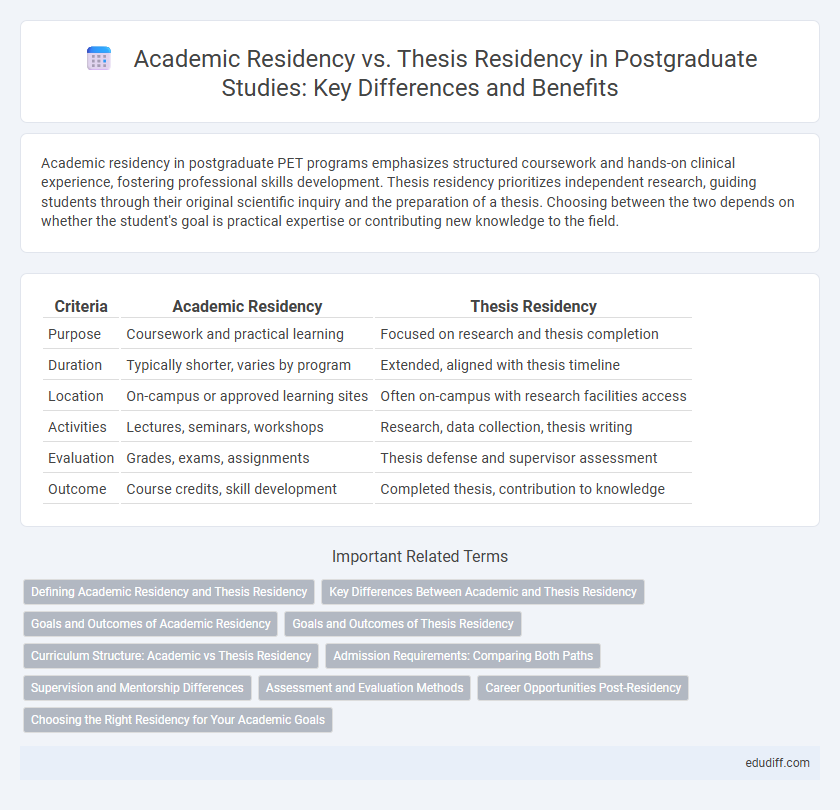Academic residency in postgraduate PET programs emphasizes structured coursework and hands-on clinical experience, fostering professional skills development. Thesis residency prioritizes independent research, guiding students through their original scientific inquiry and the preparation of a thesis. Choosing between the two depends on whether the student's goal is practical expertise or contributing new knowledge to the field.
Table of Comparison
| Criteria | Academic Residency | Thesis Residency |
|---|---|---|
| Purpose | Coursework and practical learning | Focused on research and thesis completion |
| Duration | Typically shorter, varies by program | Extended, aligned with thesis timeline |
| Location | On-campus or approved learning sites | Often on-campus with research facilities access |
| Activities | Lectures, seminars, workshops | Research, data collection, thesis writing |
| Evaluation | Grades, exams, assignments | Thesis defense and supervisor assessment |
| Outcome | Course credits, skill development | Completed thesis, contribution to knowledge |
Defining Academic Residency and Thesis Residency
Academic Residency refers to a structured period during a postgraduate program where students engage in intensive coursework, seminars, and academic activities designed to deepen theoretical knowledge and research skills. Thesis Residency, on the other hand, is a defined phase dedicated exclusively to conducting research, data collection, and writing under faculty supervision, culminating in the completion of the thesis project. Both residencies serve distinct purposes: Academic Residency emphasizes knowledge acquisition and preparation, while Thesis Residency focuses on practical research application and thesis development.
Key Differences Between Academic and Thesis Residency
Academic residency involves structured coursework and seminars designed to build comprehensive knowledge in a postgraduate program, while thesis residency emphasizes concentrated research and the development of a dissertation under faculty supervision. Academic residency typically requires attendance on campus during scheduled terms, fostering classroom interaction and multidisciplinary learning, whereas thesis residency offers flexible scheduling focused on individual research progress. The key differences lie in the objectives, with academic residency centered on coursework completion and thesis residency dedicated to original research culminating in a scholarly thesis.
Goals and Outcomes of Academic Residency
Academic residency in postgraduate programs emphasizes immersive coursework and interdisciplinary collaboration designed to deepen theoretical knowledge and research skills. It fosters critical thinking, comprehensive understanding of subject matter, and prepares students for complex problem-solving within their discipline. Outcomes include enhanced academic proficiency, robust scholarly networks, and readiness for advanced research or professional practice.
Goals and Outcomes of Thesis Residency
Thesis Residency focuses on developing research skills, critical analysis, and academic writing necessary for producing a thesis or dissertation. Its goal is to provide hands-on experience in conducting original research, data collection, and scholarly communication, preparing students for successful thesis completion. Outcomes include mastery of research methodologies, enhanced problem-solving abilities, and readiness for academic publication or professional application.
Curriculum Structure: Academic vs Thesis Residency
Academic Residency emphasizes structured coursework and comprehensive seminars designed to build foundational knowledge and research skills within the postgraduate curriculum. Thesis Residency centers on independent, focused research work, allowing students to apply theoretical frameworks directly to their thesis development and final dissertation. Curriculum structure in Academic Residency integrates continuous assessment and interdisciplinary collaboration, whereas Thesis Residency prioritizes individualized mentorship and extensive research output.
Admission Requirements: Comparing Both Paths
Academic residency requires full-time enrollment in coursework with a minimum credit load, often demanding proof of satisfactory academic standing and timely progression through the curriculum. Thesis residency focuses on dedicated research work, mandating enrollment in specific thesis or research credits and submission of a formal proposal approved by the supervisory committee. Both paths typically require fulfillment of university residency policies, but thesis residency emphasizes research competency and proposal acceptance, while academic residency prioritizes coursework completion and exam requirements.
Supervision and Mentorship Differences
Academic Residency typically involves structured coursework and collaborative learning environments where supervision focuses on developing research skills and theoretical knowledge through direct faculty interaction. Thesis Residency emphasizes individualized mentorship, guiding students through their original research projects with personalized feedback and extensive one-on-one meetings to refine the thesis. Supervision in Academic Residency is generally broader and group-oriented, whereas Thesis Residency prioritizes tailored mentorship to ensure the successful completion of the research thesis.
Assessment and Evaluation Methods
Academic Residency emphasizes comprehensive coursework completion and practical examinations to evaluate theoretical knowledge and professional competencies. Thesis Residency centers on original research development, assessed through proposal defenses, periodic progress reviews, and a final written thesis evaluated by a committee of experts. Both residencies use qualitative and quantitative rubrics to ensure rigorous assessment aligned with postgraduate academic standards.
Career Opportunities Post-Residency
Academic residency provides specialized research experience that enhances skills critical for doctoral or postdoctoral roles in academia and research institutions. Thesis residency emphasizes the completion and defense of a major research project, preparing graduates for careers that require strong independent research capabilities, such as roles in industry R&D or specialized professional fields. Both residencies significantly influence career trajectories by aligning practical expertise with the demands of targeted sectors, thereby expanding opportunities for advancement in competitive academic and professional landscapes.
Choosing the Right Residency for Your Academic Goals
Choosing the right residency for your postgraduate journey involves understanding the distinct purposes of academic residency and thesis residency. Academic residency emphasizes coursework and comprehensive exams to build a solid theoretical foundation, while thesis residency is centered on focused research and thesis development, essential for original contributions to your field. Aligning your residency choice with your career objectives ensures effective progress toward specialized expertise and academic success.
Academic Residency vs Thesis Residency Infographic

 edudiff.com
edudiff.com